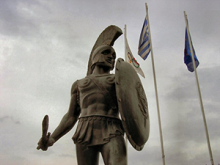Article
Built on the banks of the Eurotas River, Sparta was an ancient city-state run by a stalwart military oligarchy that rose to dominance in 650 BCE. In order to develop the most formidable military force in the Mediterranean world, Spartan citizens forewent any education in the arts, instead sending their boys at age seven to begin the rigorous training in the Agoge system. Concentrating in weapons instruction and extreme athleticism, male students also were taught the philosophy of war and the logic of battle. Men were expected to marry and start producing a family the age of twenty and serve in the militia until the age of thirty, if they lived that long. It is from the intensity and intimacy of this male-only period of training and service that theories regarding homoerotic relationships between Spartan soldiers stem, acknowledging the bonds of friendship, love, and loyalty that develop over prolonged periods of intense engagement.
Although they did not receive military training, women were educated as well and enjoyed relatively more rights than women in other parts of the classical world. Regardless of gender, however, the Spartan existence consisted of deprivation, endurance, and profound dedication to its ideals. It is from this sense that today's use of "spartan" derives its meaning, in terms of lifestyles or choices that reject luxury in favor of austerity, frugality, stringency, and severity.
Today, Sparta is the capitol of Laconia, Greece and its main economy is in citrus and oils.
"King Leonidas, ruler of Sparta, erected by Panos S. Koumantaros, 1968" by is licensed under CC BY-SA.
Manuscripts
References
Cartledge, Paul and Spawforth, Antony
2001 Hellenistic and Roman Sparta (2 ed.), Oxford: Routledge
Encyclopaedia Britannica
N.d. Sparta: Ancient city, Greece. Encyclopaedia Britannica.

